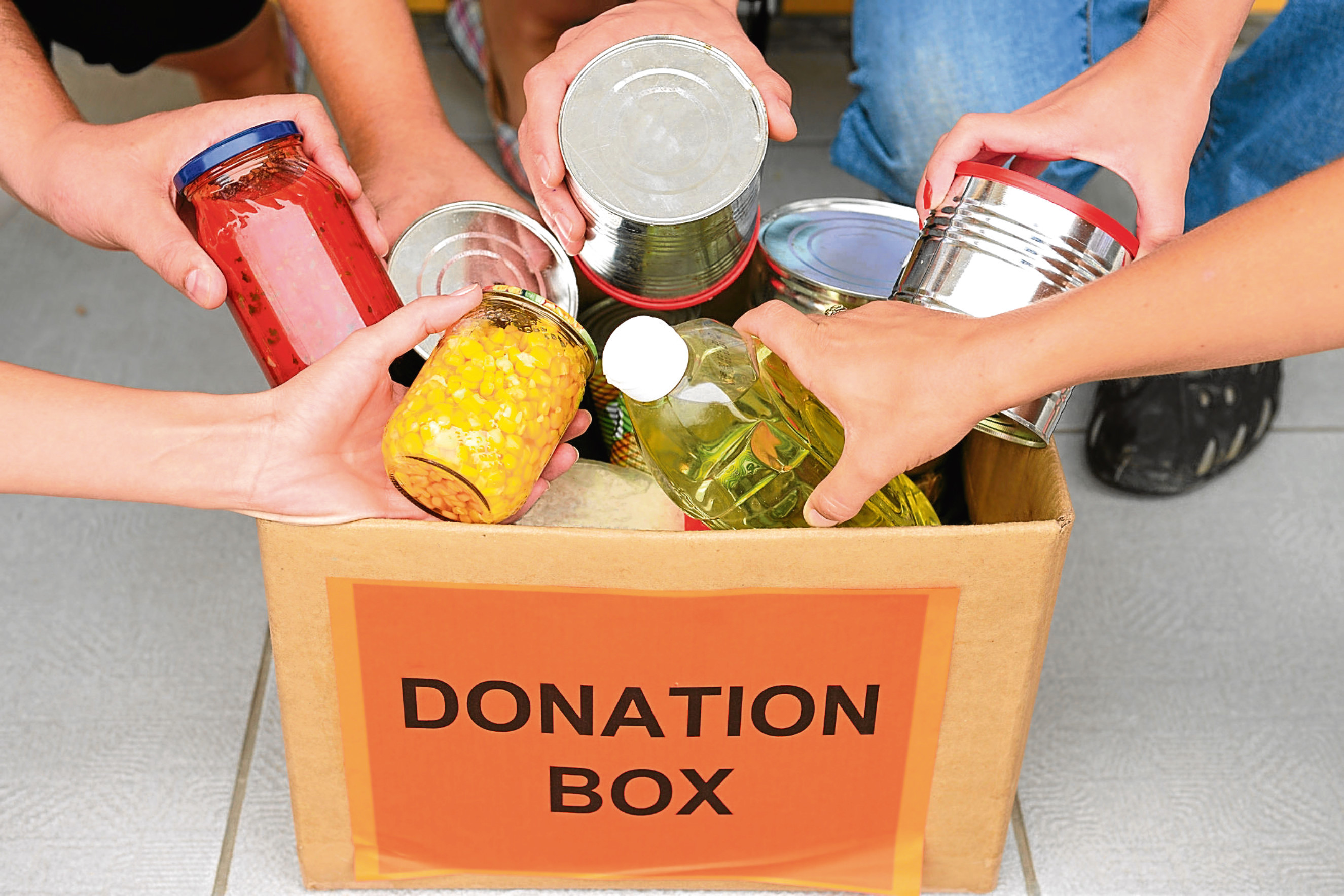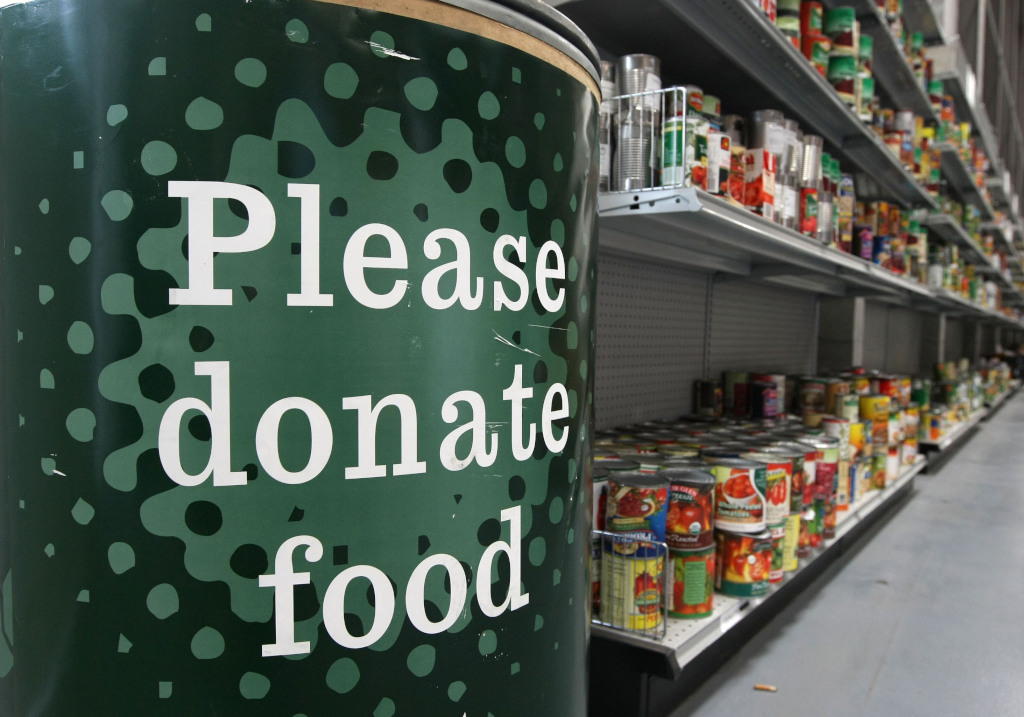Ways to donate food
- Directly to your local food bank – find your nearest one here.
- At collection points in supermarkets across the country.
- By hosting a collection at your school, church or business for your local food bank.
Full Answer
What restaurants donate food?
Jun 22, 2020 · Food banks normally work with support from the public, who donate non-perishable food at a range of places such as schools, churches and local businesses, as well as supermarket collection points. Then volunteers sort the produce into emergency food parcels to give to people in need.
What places accept food donations?
Nov 12, 2021 · Not all food banks have the capacity for large food donations. Before beginning to collect food donations, you should always contact your local food bank. Collecting and receiving food drive donations may cause unforeseen problems and …
What food items can you donate?
Jan 14, 2020 · What food you CAN donate to your local food bank: This part is pretty easy. Food banks accept dry and canned food donations. What does that mean? Basically, any food that is “shelf-stable” or nonperishable – you can keep it in your pantry and it won’t go bad. And remember, only donate food that hasn’t reached its “sell-by” date yet.
Where to donate perishable food?
Donations. Donating wholesome food for human consumption diverts food waste from landfills and puts food on the table for families in need. Donations of nonperishable and unspoiled perishable food from homes and businesses help stock the shelves at food banks, soup kitchens, pantries, and shelters.

Can you donate money to your local food bank?
If you want to give food, you can drop it off at your local food bank or at a donation point in supermarkets across the country. The Trussel Trust advises checking with your local food bank before donating to see what supplies they currently need.Dec 17, 2021
What items do food banks need most?
Specifically, food banks often need items like:Canned soup.Canned fruit.Canned vegetables.Canned stew.Canned fish.Canned beans.Pasta (most prefer whole grain)Rice (most prefer brown rice)More items...•Jan 14, 2020
How can I help my local food bank?
How you can get involvedFind your local Food bank – find out what items they need, this can be found on their web page, email or call to check before donating.Deliver to a collection point – direct to local food bank, supermarket, church, or organise you own local collection point in your office (if safe to do so)More items...
How do I donate to NYC food banks?
For immediate assistance with donating a large amount of food, please call our Food Sourcing Department at 212.566. 7855 ext. 2250.
What can you not donate to a food bank?
What can you donate to a food bank? The main thing to bear in mind is that whatever you give may be stored for some time before it goes to those who need it. Avoid things like fresh fruit and veg, fish, meat and dairy products as it might go bad and the food bank is unlikely to accept it.Oct 8, 2020
What do you give to a food bank?
What to donate to a food bankCereal.Soup.Pasta.Rice.Tinned tomatoes/ pasta sauce.Lentils, beans and pulses.Tinned meat.Tinned vegetables.More items...•Jun 22, 2020
Can anyone use a food bank?
At a fundamental level, food banks are there for anyone in the community who needs them. Often, food bank users are unemployed or unable to work due to a physical or mental disability. They may be single-parent families or waiting to receive benefit payments.Feb 19, 2021
Do food banks take toiletries?
Take a look at what's in a food parcel to see what items to donate, and don't forget that food banks also accept essential non-food items such as toiletries and hygiene products, helping people in crisis to maintain dignity and feel human again.
What can you not donate to a food bank UK?
Non-food itemsToiletries – deodorant, toilet paper, shower gel, shaving gel, shampoo, soap, toothbrushes, tooth paste, hand wipes.Household items – laundry liquid detergent, laundry powder, washing up liquid.Feminine products – sanitary towels and tampons.Baby supplies – nappies, baby wipes and baby food.More items...
Is Food Bank NYC a good charity?
Good. This charity's score is 87.54, earning it a 3-Star rating. Donors can "Give with Confidence" to this charity.
Where can I donate unopened food in NYC?
Where to donate food in NYCCamba's Where You Can Food Drive. Bring canned food donations to any of Camba's five Brooklyn locations to help stock the organization's emergency food pantry, which feeds 4,300 Brooklynites a month. ... Part of the Solution. ... West Side Campaign Against Hunger.Nov 10, 2017
What can I do with extra food in NYC?
Individual residents wishing to donate their own excess food may search donateNYC's online map to find locations throughout the city. No weight minimums: Donors can post any quantity of safe, edible food.
What does it mean when you donate a dollar?
This means that when you donate a dollar, you’re able to put more meals on the tables of families than if you donated food you'd purchased at the store.
How many people are at risk of hunger in 2019?
August 21, 2019. With 42 million people in the U.S. at risk of facing hunger due to the pandemic, donating your extra or purchased dry and canned goods through a food drive might seem like the best way to help your neighbors need. But, the best way to support your local food bank is actually through donating money.
Can you live on non-perishable items?
Canned goods and dry food items like pasta and rice are a vital part of our food banks and pantries—but no one can live healthy lives on non-perishable items alone. Feeding people isn’t just about providing food, but about providing healthy food to all of our communities.
What is the Federal Food Donation Act?
Federal Food Donation Act of 2008 (PDF, 142 KB) specifies procurement contract language that encourages federal agencies and contractors to donate excess wholesome food to eligible nonprofit organizations to feed food-insecure people in the United States.
What is gleaning in food?
Gleaning is the collection of excess fresh foods from farms, gardens, farmers markets, and other sources to provide it to those in need. Typically, volunteers partner with a farm to glean excess fresh produce and deliver it to a food bank or food pantry.
What can I give to a food bank?
Your local food bank will likely accept almost any non-perishable food item, but here are the items that food banks want the most: 1 Peanut butter 2 Canned soup or stew 3 Canned fruits and vegetables 4 Canned fish 5 Canned or dried beans 6 Pasta (preferably whole grain) 7 Rice (preferably brown rice)
What do food banks need?
But, because fresh food needs to be refrigerated or frozen and food banks have limited space for this , they often get fixed donations from nearby grocery stores instead of taking small donations from individuals . This also makes it easier for them to make sure that fresh food has been safely stored, which helps prevent spoiled or moldy food.
Why is food insecurity a problem?
Food insecurity is a complex issue. It’s rooted in poverty — people can’t access adequate fresh food if they can’t afford to buy it. It’s exacerbated by the fact that low-income neighborhoods typically have fewer grocery stores and less reliable public transportation, so residents also have less physical access.
How many Americans are food insecure in 2019?
In 2019, 10% of Americans didn’t have access to enough nutritious foods to meet their needs, which is another way of saying that they were food insecure. Thanks to the effects of the ongoing COVID-19 pandemic, particularly higher rates of unemployment, that number has risen to 15%.
Why are school lunches so popular?
If you’ve ever wondered why people make such a big deal of healthy school lunches, it’s because one in six children don’t have regular access to healthy food at home — school lunch may be their main source of fruits, vegetables, and other healthy foods. COVID-19 has really thrown this for a loop, since many students are learning virtually instead of going to school in person.
Does sodium increase heart disease?
Too much sodium increases a person’s risk for heart disease and stroke, and food insecure individuals may already be at higher risk. Also, stick to fruits and vegetables that are canned in water instead of syrup, or that are labeled "no added sugar.".
Does sugar affect diabetes?
As too much sugar increases a person’s risk of type 2 diabetes, and makes it harder for people with type 2 diabetes to manage their blood sugar. And, again, people who are food insecure may already be at a higher risk.

Popular Posts:
- 1. where to donate clothes for homeless near me
- 2. where to donate yur body to science new mexico
- 3. where to donate printers and fax machines in lakewood colorado
- 4. how long does it take to donate plasma
- 5. where to donate socks to homeless december 2016
- 6. tom clancy the divison 2 how to donate only so much of a rsource
- 7. where to donate houston
- 8. how to donate goodwill
- 9. where to donate women's clothes near me
- 10. how much does walgreen donate on get a shot give a shot